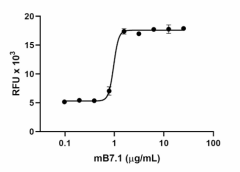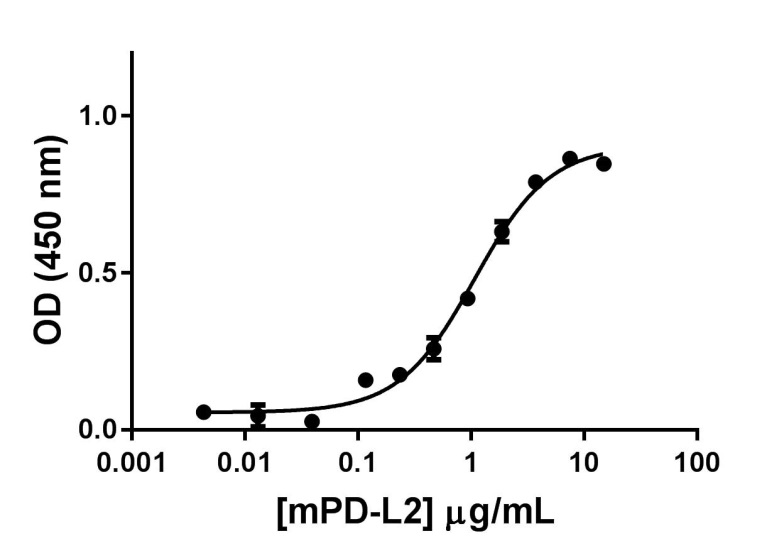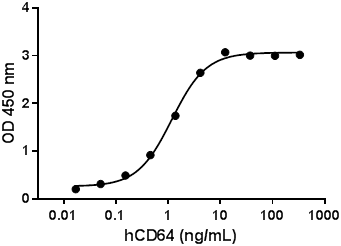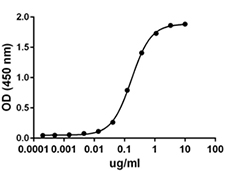- Regulatory Status
- RUO
- Other Names
- B-Lymphocyte activation antigen B7.1, CD80, Ly53, TSA1, CD28 ligand (CD28L), MIC17
- Ave. Rating
- Submit a Review
- Product Citations
- publications

-

Immobilized mouse B7.1 induces proliferation of human T cells in the presence of anti-human CD3. The ED50 is 1 - 10 µg/mL. In addition, mouse B7.1 induces IL-2 production on activated T cells. Results may vary depending on human donors.
| Cat # | Size | Price | Quantity Check Availability | Save | ||
|---|---|---|---|---|---|---|
| 555404 | 25 µg | 118€ | ||||
| 555406 | 100 µg | 278€ | ||||
The B7 family of proteins are structurally related, cell membrane-associated molecules that regulate immune responses by delivering costimulatory or coinhibitory signals via their ligands. So far, eight family members have been identified, including B7.1, B7.2, B7-H1, B7-H2, B7-H4, B7-H6, PD-L1, and PD-L2. These proteins are mainly expressed by activated antigen presenting cells (APCs) and when paired with either CD28 or CTLA-4 on a T lymphocyte, they induce an increase or decrease in the downstream signaling activity of the MHC-TCR interaction between APCs and T cells. B7.1 has been shown to bind both CTLA-4 and CD28; however, it has a 20-fold higher affinity to CTLA-4 than to CD28. Despite their structural similarities, the individual contribution of B7.1 and B7.2 to the development of pathogenic T cells in autoimmune diseases and protective T cells in infectious diseases is markedly distinct. Besides regulating T cell immune responses, B7 also plays a role in anti-tumor immunity. This is confirmed by demostrating that cytotoxic T cells were able to eradicate tumor cells transfected with B7.1 and B7.2. After activation, follicular lymphoma was shown to upregulate B7.1 and other costimulatory and adhesion molecules, therefore increasing APC activity and amplifying primed T cell responses. Homozygous null B7.1/B7.2 mice fail to generate antigen specific IgG1 and IgG2a responses, suggesting that B7 proteins are important in Ig immune responses. Mouse and human B7.1 share 44% amino acid identity.
Product DetailsProduct Details
- Source
- Mouse B7.1, amino acids (Asp37-Lys245) (Accession# NP_033985.3), was expressed in CHO cells with a C-terminal His-Fc tag and a linker sequence.
- Molecular Mass
- The 449 amino acid recombinant protein has a predicted molecular mass of approximately 51 kD. The protein migrates at approximately 72 kD in DTT-reducing conditions and at approximately 150 kD in non-reducing conditions by SDS-PAGE. The predicted N-terminal amino acid is Asp.
- Purity
- >95%, as determined by Coomassie stained SDS-PAGE.
- Formulation
- 0.22 µm filtered protein solution is in PBS.
- Endotoxin Level
- Less than 1.0 EU per µg of protein as determine by the LAL method.
- Concentration
- 25 µg size is bottled at 200 µg/mL. 100 µg size and larger sizes are lot-specific and bottled at the concentration indicated on the vial. To obtain lot-specific concentration and expiration, please enter the lot number in our Certificate of Analysis online tool.
- Storage & Handling
- Unopened vial can be stored between 2°C and 8°C for up to 2 weeks, at -20°C for up to six months, or at -70°C or colder until the expiration date. For maximum results, quick spin vial prior to opening. The protein can be aliquoted and stored at -20°C or colder. Stock solutions can also be prepared at 50 - 100 µg/mL in appropriate sterile buffer, carrier protein such as 0.2 - 1% BSA or HSA can be added when preparing the stock solution. Aliquots can be stored between 2°C and 8°C for up to one week and stored at -20°C or colder for up to 3 months. Avoid repeated freeze/thaw cycles.
- Activity
- Immobilized mouse B7.1 induces proliferation of human T cells in the presence of anti-human CD3. The ED50 is 1 - 10 µg/mL. In addition, mouse B7.1 induces IL-2 production on activated T cells. Results may vary depending on human donors.
- Application
-
Bioassay
- Application Notes
-
BioLegend carrier-free recombinant proteins provided in liquid format are shipped on blue-ice. Our comparison testing data indicates that when handled and stored as recommended, the liquid format has equal or better stability and shelf-life compared to commercially available lyophilized proteins after reconstitution. Our liquid proteins are verified in-house to maintain activity after shipping on blue ice and are backed by our 100% satisfaction guarantee. If you have any concerns, contact us at tech@biolegend.com.
- Product Citations
-
Antigen Details
- Structure
- Homodimer
- Distribution
-
Activated B cells, monocytes, macrophages, dendritic cells
- Function
- Plays a role in T cell activation; CD80 and CD86 play an important role in T cell priming.
- Interaction
- T cells
- Ligand/Receptor
- CD28, CTLA-4
- Bioactivity
- Immobilized mouse B7.1, in conjuction with anti-CD3, is able to induce human T cell proliferation and IL-2 secretion.
- Biology Area
- Cell Biology, Costimulatory Molecules, Immunology, Neuroscience, Neuroscience Cell Markers
- Molecular Family
- CD Molecules, Immune Checkpoint Receptors, Soluble Receptors
- Antigen References
-
1. Freeman GJ, et al. 1993. Science 262:909.
2. Azuma M, et al. 1993. Nature 366:76.
3. Gimmi CD, et al. 1991. Proc. Natl. Acad. Sci. USA 88:6575.
4. Linsley PS, et al. 1991 J. Exp. Med. 173:721.
5. Greaves P and Gribben JG, 2013. Blood. 121: 734.
6. Czuczman MS, et al. 2005. J. Clin. Oncol. 23:4390. - Gene ID
- 12519 View all products for this Gene ID
- UniProt
- View information about B7.1 on UniProt.org
Related Pages & Pathways
Pages
Related FAQs
- Why choose BioLegend recombinant proteins?
-
• Each lot of product is quality-tested for bioactivity as indicated on the data sheet.
• Greater than 95% Purity or higher, tested on every lot of product.
• 100% Satisfaction Guarantee for quality performance, stability, and consistency.
• Ready-to-use liquid format saves time and reduces challenges associated with reconstitution.
• Bulk and customization available. Contact us.
• Learn more about our Recombinant Proteins. - How does the activity of your recombinant proteins compare to competitors?
-
We quality control each and every lot of recombinant protein. Not only do we check its bioactivity, but we also compare it against other commercially available recombinant proteins. We make sure each recombinant protein’s activity is at least as good as or better than the competition’s. In order to provide you with the best possible product, we ensure that our testing process is rigorous and thorough. If you’re curious and eager to make the switch to BioLegend recombinants, contact your sales representative today!
- What is the specific activity or ED50 of my recombinant protein?
-
The specific activity range of the protein is indicated on the product datasheets. Because the exact activity values on a per unit basis can largely fluctuate depending on a number of factors, including the nature of the assay, cell density, age of cells/passage number, culture media used, and end user technique, the specific activity is best defined as a range and we guarantee the specific activity of all our lots will be within the range indicated on the datasheet. Please note this only applies to recombinants labeled for use in bioassays. ELISA standard recombinant proteins are not recommended for bioassay usage as they are not tested for these applications.
- Have your recombinants been tested for stability?
-
Our testing shows that the recombinant proteins are able to withstand room temperature for a week without losing activity. In addition the recombinant proteins were also found to withstand four cycles of freeze and thaw without losing activity.
- Does specific activity of a recombinant protein vary between lots?
-
Specific activity will vary for each lot and for the type of experiment that is done to validate it, but all passed lots will have activity within the established ED50 range for the product and we guarantee that our products will have lot-to-lot consistency. Please conduct an experiment-specific validation to find the optimal ED50 for your system.
- How do you convert activity as an ED50 in ng/ml to a specific activity in Units/mg?
-
Use formula Specific activity (Units/mg) = 10^6/ ED50 (ng/mL)

 Login / Register
Login / Register 














Follow Us